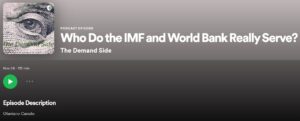The Demand Side

- How the IMF and World Bank came into existence, why they are needed, what were the problems these institutions were designed to fix?
- So why has it seemed that, in recent decades, these institutions have become more concerned with promoting capital account liberalization more so than anything else?
- A case could be made that some of the prescriptions of the IMF and World Bank may not actually improve the economic prospects of the countries they engage with. What is your take on their effectiveness?
- Can the IMF do a better job of perhaps staying away or “doing no harm” by choosing not to lend to countries who are insolvent, or are there actually things that they can do to help?
- So, could these institutions use a healthy dose of not only educational diversity, but also geographical diversity in its leadership and staff?
- Is there a world where we shift away from austerity being a condition for lending, or is the IMF so concerned about getting its money back—and a decent return—that they feel they have to impose these measures so they can appease the US and other member countries that hold large voting blocs?
- If the IMF and World Bank are to be truly international institutions, with input from all of its member countries, doesn’t the voting structure have to change, and isn’t the current voting framework quite different from how it was when the IMF and World Bank were created?
- So, what are some things they should be proud of, and what do you believe should be the role of the IMF and World Bank in the 21st century?

This Post Has One Comment
You are my breathing in, I possess few web logs and rarely run out from to brand. Wandis Derick Vitia
Comments are closed.